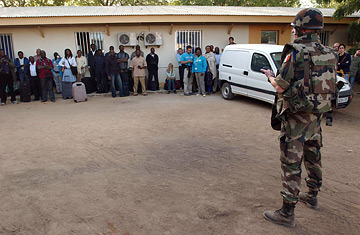
A French soldier talking to foreign nationals during evacuations from N'Djamena.
A relative calm returned to the streets of N'Djamena after rebel forces withdrew Sunday to the outskirts of the Chadian capital following a weekend of heavy fighting with government troops. The lull in the violence allowed the French Army to airlift over 800 foreigners out of Chad, 202 of whom touched down in Paris Sunday, tired but unharmed. The rebels retreated in the face of a successful counter-offensive mounted by units loyal to President Idriss Déby. But fears remained high in N'Djamena and abroad that the retreat is temporary and that the bloodletting may be far from over.
The 2,000 to 3,000 rebel fighters who stormed N'Djamena Friday evening withdrew when formerly grounded Chadian Army helicopters attacked their trucks and positions in the capital. What they left in their wake bore witness to the intense and random nature of the violence. N'Djamena's main business street, the avenue Charles de Gaulle, was littered with destroyed cars, burned corpses, and the detritus of trees cut down by flurries of machine gun and rocket fire, according to eyewitnesses. Although initial reports described fighting limited to rebel and government forces, French aid agency Médecins Sans Frontières said it had seen hundreds of wounded people, the vast majority of them civilians. Many of those will wind up dying, the group warned, for lack of available medical care.
The rebels claimed their fall back was merely a tactical move to resupply and organize a final push on the capital. Thousands of Chadian civilians flocked from N'Djamena Monday ahead of a feared resurgence in fighting in the coming hours or days. Rebel leaders pledged to finish off the government forces in N'Djamena once they'd regrouped, and threatened to attack an airbase French troops are using to airlift foreigners caught up in the fighting. The insurgents claim the airlifts served as cover for the rocket-firing Chadian army helicopters, which operate out of the same airstrip and that pounded rebel positions.
The rebels weren't the only ones loudly rattling their sabers during the lull. Chadian Foreign Affairs Minister Amad Allam-Mi triumphantly proclaimed insurgent forces "defeated" as he told Radio France International "the battle for N'Djamena is over." Echoing accusations voiced by other African regimes that the Chadian anti-government fighters are financed and trained by Khartoum, Allam-Mi warned that "if it's necessary for the security, defense, and integrity of Chad, we'll go all the way to Sudan" to wipe them out.
Thousands of N'Djamena residents took that swaggering as a sure sign it was time to flee, and French troops picked up the pace of their airlift. By noon Monday, the French Army said it had transported more than 800 foreign nationals to Gabon, around 570 of whom have been flown on to France. Another 200 are waiting to be evacuated from Chad. Around 1,500 French soldiers are stationed in Chad under bilateral security accord.
Paris, often prone in the past to take action in conflicts that imperil friendly African regimes, has thus far taken pains to stay out of the current Chadian conflict. Though French President Nicolas Sarkozy has been in repeated phone contact with Déby throughout the crisis, his proposals to help have been limited to offering the President safe passage and refuge in Paris — a proposition the mutiny-hardened Déby declined. But despite what French Defense Minister Hervé Morin called France's "neutral" position in the conflict, he and other diplomats have begun venting anger over the rebel offensive, for which they, too, hold Sudan responsible.
As Morin did over the weekend, French officials are describing the timing of Thursday's rebel push from Sudan as designed to disrupt impending deployment of the European Union's 3,700 EUFOR peacekeeping force along Chad's eastern border. Those troops are charged with establishing safe zones to protect refugees from violence-torn Darfur. That imposition of well-armed foreign soldiers, French officials say, would have complicated Khartoum's plans to destabilizing the Chadian regime.
"Why did the intervention happen now?" asked Sarkozy's advisor, Claude Gueant, on Europe 1 radio. "It was the last chance before the arrival of EUFOR, which was starting to be put in place, for Sudan to reach its goal: to try to liquidate the regime of Idriss Déby."
And because many diplomats see that offensive as just one part of wider patchwork of cross-border African conflicts, some are intimating threats of additional peacekeeping operations as a means of making life harder on troublemakers in the region. "We are not involved in this war," French Foreign Minister Bernard Kouchner said as he welcomed people airlifted from Chad to Paris Monday. "For now, there's no change in that. But if there's a [United Nations] Security Council resolution, or if there was another suggestion [for a more active role] during an African Union summit, we'd see."
